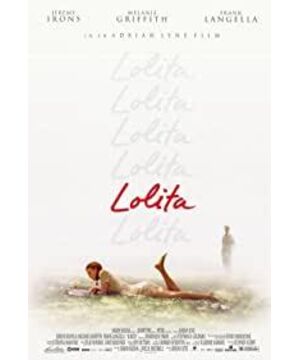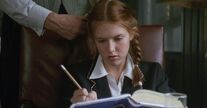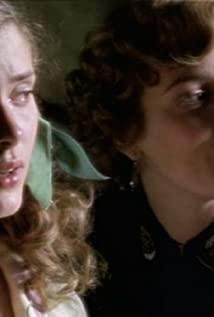Text/Buenos
In 1955, "Lolita" was published by Olympia Publishing House in Paris, and it caused great controversy as soon as it appeared. All the sentences and leaves are peeled off, and the last remaining main story is shocking—the pedophile plot of a middle-aged man; and the incest lust of a 12-year-old girl. In 1956, Nabokov also wrote an article "About a Book with the Title "Lolita"" to explain the reason for the writing of the novel. In his writing, the initial throbbing of creation came from such a news: a monkey is here. Scientists have completed the world’s first animal painting under a few months of training. The content is the iron bar of the cage in which it is imprisoned-what an ironic statement. We can’t judge the truth or not, but understand his cunning, arrogant, and rebellious character traits. Probably never bothered to cover up. He also emphasized that "Lolita does not contain moral preaching", and detailed the experience of this manuscript being rejected by many American publishing houses with ridicule. The reasons include "there are no good people in the book", "The second part of the book is too long", "If this book is printed, the president and you will have to go to the classroom." However, the book was published in the United States in 1958 after all, and it was quickly translated into Nabokov’s mother tongue, Russian. In the following two decades, it continued to expand with various controversies and prohibitions. Reputation and world influence.
Even if the title of "erotic novels" has attracted the attention of the world, it is one thing we are grateful for. For a novel, it is better to be widely discussed than to be unfamiliar, and "Lolita" is finally recognized by the world. Become one of the most influential novels of the twentieth century. After all, under its “erotic,” “vulgar,” and “indecent” appearance, it contains at least three immortal things: one motivated by emotions The postmodern style of plot; a paradigm of "girl" sexual aesthetics; the craziest and hopeless love of a man.
Perhaps it is a good idea to analyze the other two movies "Lolita" from these three angles.
In 1962, Kubrick put "Lolita" on the big screen for the first time. On the one hand, it was demanded by the times and the censorship system. On the other hand, the story was inevitably reversed by Lao Ku's purely masculine thinking. In the novel, Humbert's feelings, senses, and emotions are used to advance the plot. They are all abandoned in Lao Ku movies and replaced by a love crime or even comedy with a very popular plot, rhythm, and technique. After all, this project was originally launched in a hurry-the novel caused a sensation and controversy in the second year after its publication. Many copycat works immediately appeared all over the world, including some Italian and Spanish erotic films, and Kubrick and the producer Harris After winning the right to adapt the script in 1959, we must race against time to establish a "genuine" image. When did the American film censorship system still exist, the "sexual liberation" thought did not exist until the end of the 1960s. Therefore, Kubrick's primary question in dealing with film censorship is not whether the heroine "Lolita" is lustful or not. The public accepted it, but whether the male protagonist Humbert is tall, handsome, and decent enough to bring out the slightest insignificant, low-level impression, and even the soundtrack has to bear great pressure for this, because Kubrick is afraid of it. Disharmonious melody will damage Humbert's image.
Under such considerations, Humbert’s actors ranged from James Mason, Lawrence Oliver to David Niven. They were all British actors who were very popular at the time and were famous for their gentleman image and a little classical temperament. Obstructed by their respective agencies, Marlon Brando, who has become a Hollywood superstar, also took the initiative to express interest, and this famous "bad boy" obviously did not meet the director's expectations. Fortunately, James Mason changed his mind at the end of his wife’s persuasion, and appeared with his gentle charm. Obviously, Humbert’s full stomach of emotions and desires in the book has nothing to say on Mason. The book has all kinds of meanings. The plot driven by the chaotic little emotions is fully logicalized in the film. For example, the initial interaction between Humbert and Lolita has a very humorous sense of programming-Humbert, who is reading on the porch, is shaken. Lolita of the hula hoop was distracted, Humbert used a very gentleman's gesture to soothe the frightened girl in the cinema... The girl appeared mature, dignified, and the man restrained and calm, just implying the slow and normal love of the two, without feeling anything. spark. After the tragic death of Mrs. Haze, the smell of gunpowder between the two became stronger, the quarrel during the trip, Humbert's unreasonable control over Lolita, the unbearable pressure to escape from Lolita, and more showed the man's desire for control and The girl’s rebellion, the relationship between the two is completely interpreted and interpreted from the perspective of a third party and based on the "normal" lover relationship. It is just a discord between old couples and young wives that can be seen everywhere. It is quite in line with the President of the American Film Association at the time to help them pass. Opinions on the script raised by the review-"Change the theme of the film to the emotional story between a middle-aged man and the young wife who later ruined his life."
After the film was released, Nabokov was obviously very upset. First of all, he was invited and it took six months to write the script by himself. There is very little content left by Kubrick, but the director also respectfully, or rather, writes the film’s screenwriter. The title was given to Nabokov alone, which made him laugh and cry when he was nominated for the "Best Screenplay" at the Oscars the following year; secondly, Nabokov wanted to publish his own "original" Lolita script Shi was also obstructed in law by the director and his agent. It’s no wonder that when the final screenplay was published, Nabokov wrote harshly in the foreword, “I feel sorry for wasting my time, and at the same time I admire Kubrick’s perseverance, because he has six Yuedu is enduring the torture of the development of a useless work."
In 1997, the British director Adrian Lane, a well-known pornographic film, performed this story twice, but he touched Nabokov's original meaning vividly. On the one hand, Lane himself is very good at capturing emotions with images, on the other hand, The performance of actor Jeremy Irons is amazing. Without the fetters of censorship, Ryan used monologues, music, close-ups, slow motion, and appropriate erotic shots to his fullest subjective perspective to portray Humbert’s lust for Lolita like a brocade. The girl who had the first glimpse, lying on the lawn reading a magazine, her clothes and braids soaked with water, the May sun and smoke, the smell of crushed daisies and sweat, the tension in the heart of the middle-aged man How flicked from time to time, from Jeremy Irons’ eyes, from his always accurate expressions of shock, confusion, and ecstasy, Nabokov’s kind, erudite, and associative Humber Te was clothed with compassion. His lust, fantasies, and possession of Lolita did not exude a nasty and uncomfortable atmosphere, but made people considerate.
The most worthy of comparison with the Kubrick version is that before Lolita was sent to the summer camp, he suddenly said goodbye to Humbert. The Kubrick version made Lolita run up the stairs and Humbert. There was a sincere dialogue, "Will you forget me?" Obviously, this was a mutual complaint within the scope of ethics, and Ryan perfectly restored the amazing kiss in Nabokov's original work, even Even more unforgettable-the camera quickly and swayly approached the middle-aged man in pajamas greeted by Lolita's footsteps, she threw into his arms in an unreserved and completely trusting way- The whole person spread his hands and feet on him, stamped a deep kiss on his lips, then turned his head and ran off without saying a word, leaving behind the middle-aged man who was "almost destroyed by the extremely powerful swelling heart" , Enjoy the moment of "stopping of destiny". Scheduling, photography, performance, emotions, all in one go, everything is impeccable. Even when Nabokov himself was writing the script, he didn't dare to restore the intensity, but changed it to "When she stood on tiptoe and kissed Humbert, Humbert avoided her approaching lips, I kissed her emotionally on the forehead."
In the latter part of the film, we can get very precise into his worry, doubt, and fear of losing Lolita, the restlessness of those small hotels at night, the peeping in the dark of the terrace and the smoke. The director also succeeded in passing Humbert’s perspective. Spelling out the image of the "abductor" Quilty slowly, echoing in many places, perfectly reproduces the splicing skills of time and space in Nabokov's novels-so that the reader or the audience can "perceive" that person all the way, and then let the memory make He is clear and finally introduces revenge, and everything is laid out through just the right emotions.
"He must be an artist, a madman, a person full of shame and hesitation, to recognize that fascinating little fairy." Nabokov defined Humbert this way in the preface of the script, so he was subjectively All the words from the perspective can be so elusive, and the restored image should be the same. It can be said that the director first perceives Nabokov perfectly, and then translates his words into images. In this sense, the 1997 version of "Lolita" was extremely successful.
Similarly, the 97 version of "Lolita" is also impeccable in establishing a paradigm for "girl" sexual aesthetics. In fact, Dominic Swan was 15 years old when he starred in the movie, one year older than Sue Leon, who was criticized by Nabokov for being "too old", but he was still a middle school student and had no acting experience. The universal style is a hundred times better than Leon. In the film, she has too many fascinating and ambiguous actions. Her sleepy eyes ask for water to drink. After drinking, she wipes her mouth on Humbert's shoulder and puts a little bit of water. She stayed on his pajamas with the remnants of lipstick overnight. She was eager to mature, eager to understand and use the charm of her body, her various explorations, desperate blinking, exaggerated red lips, all kinds of pranks with erotic hints , Because of his "pretense", it seems more natural and moving. This is Swann’s amazing and magical talent. No wonder he will stand out from the 2500 candidate girls, enough to give "Lolita" the immortal name. The same immortal concrete image stays in the hearts of all people who have had a nostalgic attachment to "girls". This is not about inferior lust, but after getting enlightenment-even a kind of apocalypse, and understanding the most beautiful things in life. According to Plato's theory of rationality, Nabokov's "Lolita" itself established a so-called "sexy girl" rationale in a shocking way. Just as what is "horse"? "Horse" is not any brown horse, black horse, or a lame horse without a tail, but a "horse form" in our concept that does not change with individual horses. It is a rational type. Obviously, Bokov clarified the rationale of a "sexy girl". By sketching the standard of "sexy girl" in Humbert's mind, he emphasized that it is a kind of objective beauty and an objective sexual desire that arises from it. , Even if it violates the moral and ethics in the usual sense, it can't kill this objective existence. The things that were despised under the shackles of ethics were sublimated into beauty by Nabokov.
In contrast, Kubrick, who was unfortunately filming in the 1960s, did not dare to parry Nabokov’s boldness. From the time he decided to touch this hot potato, he never stopped fighting censorship. Hollywood treats him The bondage of the heroine, even to the extent of the female protagonist’s breast development, is really difficult for the film youth who had not yet become a "master" at the time. The actresses in Kubrick's succession were obstructed and rejected by their fathers and brokerage companies. They were all afraid that these promising little beauties would be given the reputation of sex toys by this "filthy character". The age of Lolita in the film is two years older than that in the book. It is also because the laws of some states in the United States allowed 14-year-old girls to marry. The film can use this argument; the original film shot Humbert and Charlotte lingering in bed At the moment, the camera followed his gaze at the portrait of Lolita placed on the bedside table, suggesting Humbert’s sexual fantasies about Lolita, but when it was officially released, the two men were neatly dressed side by side lying on the bed and talking. With photos of Lolita...this "Lolita" did not dare to take a step beyond Lei Chi, did not mention Humbert's first love complex, and did not involve any content about the "sexual aesthetics" of girls. The restoration of Cove’s "sexy girl" rationale is even more difficult to talk about. That is the level he avoided. He added a lengthy "difficult box-spring bed" section to the script, desperately playing it down with black humor. The original sexual anomalous suggestion of the story, even the censors of the American Film Association at the time could not stand it, and wrote to him, "No matter who thinks about the morality of the book, it cannot be denied that it is a piece of literature. The facts of a masterpiece. However, in my opinion, the script is an extremely poor imitation of this important literary work."
Of course, even if he is at a disadvantage in the above two points, it does not deny the value of Kubrick’s filming of "Lolita". His adaptation and shooting behavior in itself means courage, and he is discussing "love" in black. "In this way, he is undoubtedly successful in reflecting the power of social irony. The reputation of the film in the past half a century has already explained it all. After all, the other core of the story of "Lolita" is also in the love of a man, and in the adaptation, Kubrick, who is also a man, did not pity the role of Humbert and endow it with more tragedy. It’s the logic of “follow the blame”. In the movie, he accepts Mrs. Haze because of his love with Lolita, but he has several impulses and plots to kill her. After fate makes him get what he wants in a playful way, He had an almost abnormal desire to control Lolita, which led to the separation of the two, but he did not want to repent. Instead, he blamed Lolita's departure entirely on Quilty's abduction, and went for revenge. This is a "wrong love", this is a man "wrong love", Kubrick used a very cold vision and tone to tell this story, in fact, in line with his usual cynical tone. Although you don’t see much compassion in the film, he actually mentioned it in private, just like he once told writer Gene Phillips Stein, "In the film, I can’t join Humbert and Lolita. Between the sex scenes, I can only imply that Humbert really fell in love with Lolita. Therefore, when the audience watches this film, they will soon feel that Humbert is tempted by Lolita. And in the novel It’s not like this in the middle. In the novel, Humbert found out at the end that he really fell in love with Lolita. At that time, Lolita was no longer the goddess, but a pregnant housewife. This is One of the most touching plots of the whole novel."
And this kind of "touching" that Kubrick could only talk about in private was exaggerated by Adrian Lane 35 years later without hesitation. Ryan has always been good at discussing "taboos" and "despair" in love. His previous works "I Love You for Nine and a Half Weeks" and "Immoral Dealing" are nothing less than the same, but in "Lolita", he carefully condensed the use of it. The old tricks of erotic lens laying out the relationship between men and women are only through the use of subjective perspective and details, invading and then out of Humbert's spiritual world, so we can find the context in detail. First of all, as a person who can find the rational type of "sexy girl", a middle-aged person who is picky, rich in emotions and associations, and has considerable experience, it is impossible to face the perfect representation of "sexy girl" Lolita Not to be a pessimist, because of the scarcity and supremacy of this beauty, when Humbert gets it, he must fall into a panic of fear of losing, even if he runs out of energy and money, with Lolita Traveling all the dusty roads in the United States, using all anti-detective spirit, methods, and countless lies, so as to avoid all the possibilities of space, region, ethics, and social roles that hinder their union, but he is invincible There will always be one thing, and that is time. Only time can’t keep it. The "sexy girl" will always fade and pass away. Time will take away his Lolita and give him back "that sexy girl's faint violet fragrance and withered leaves." echo".
"I have no intention of praising Humbert, he is heinous, despicable and shameless. He is a prominent example of moral corruption. But his story is full of strong love and pain, with all kinds of tenderness and sadness." This It was Nabokov who borrowed Humbert's psychiatrist Dr. John Ray to give him the compassion as the author in the script version of "Lolita". Obviously, Ryan used the most moving way to restore Humbert's "warmth and sadness". He always looked at his sexy girl with worry, knowing that she was going to escape but could only make some useless efforts in vain. He knew that using candies and gadgets could no longer satisfy and seduce her, so he could only monitor and control her, and he was losing ground in her tenderness tricks. He desperately tied her to his side, but he couldn't get rid of it. To the slightest peace of mind and happiness, there is only endless anxiety and fear, so that she is out of control and irritable. He uses his hands as a step by step to drive her away, spending countless days and nights looking for her in the rest of the anguish, empty and seemingly full hope……
Although it all started with lust, it clearly ends with love. Humbert did not stop his lifelong hobby of searching for "sexy girls" during the journey of the two being entangled in a weird relationship, but Lolita was obviously not only used to satisfy physical desires and copy a kind of rationality. Tools needed. "The light of my life, the fire of my desire, my sin, my soul" Humbert has always had a natural fanatical love for Lolita, which is not based on the communication and interaction between lovers in the usual sense. There are various ups and downs in getting along, and it is interfered by various secular factors from the outside world. It can even be said that the "existence of Lolita" itself is the whole of Humbert's love and the whole of his soul. Therefore, the loss of Lolita, Love is extinguished, soul is extinguished, and Humbert's life also loses all its brilliance.
This is the love of Humbert written by Nabokov, and it is also the love of Humbert successfully portrayed by Ryan's "Lolita". The most tearful monologue in the book is undoubtedly Humbert’s mental action when he saw Lolita, a married woman and pregnant, a few years later. It is also the part that Kubrick was frankly moved by. In the movie, Humbert, a well-dressed middle-aged man with a haggard face, choked up a few times, until this moment he was still trying to keep Lolita back to her, which undoubtedly made people feel sad. This monologue has a total of 713 words in Mr. Wan’s translation. The film has been simplified into five impeccable sentences. Please allow me to transcribe it as follows. This is what an excellent film adaptation can give. The best tribute to this immortal novel:
"I looked at her, looked at her, and looked at her. For the rest of my life, with all my heart and soul, I love her the most. I am sure, as sure as I am going to die. The fairy girl of the day is only left now. The dead leaves return home, pale, chaotic, and bloated. The flesh and blood in the belly belong to someone else, but I love her. She can fade, wither, whatever. But I just look at her, and the tenderness comes to my heart."
View more about Lolita reviews











